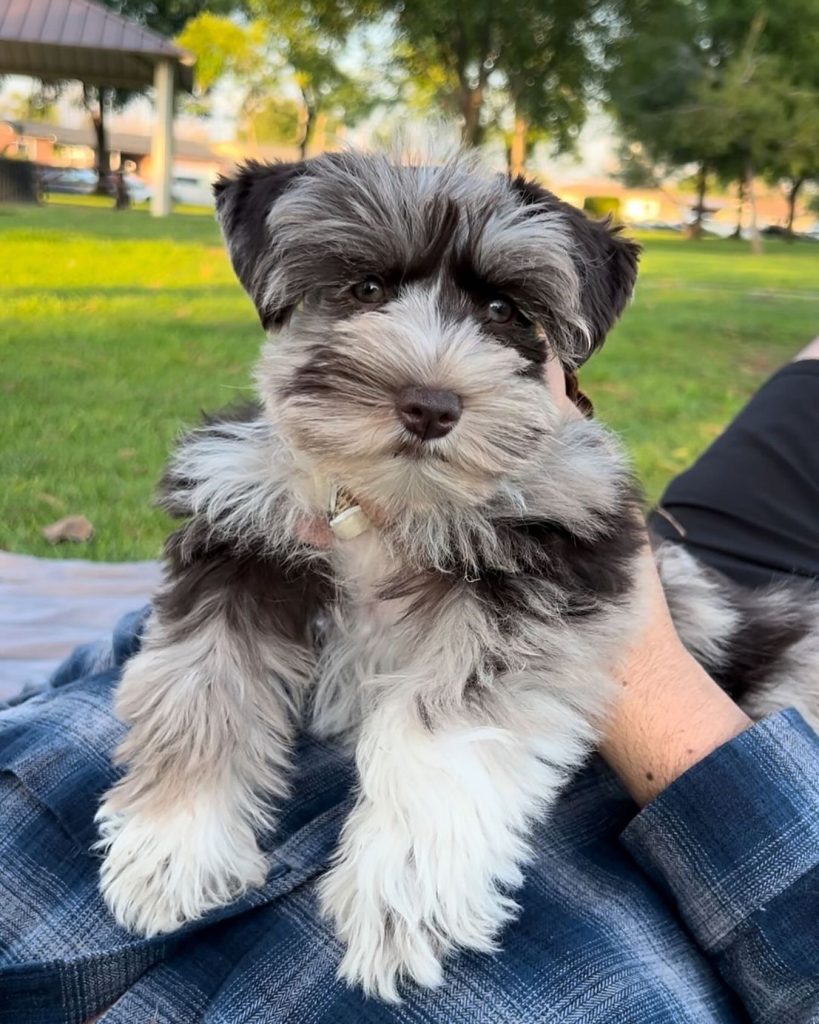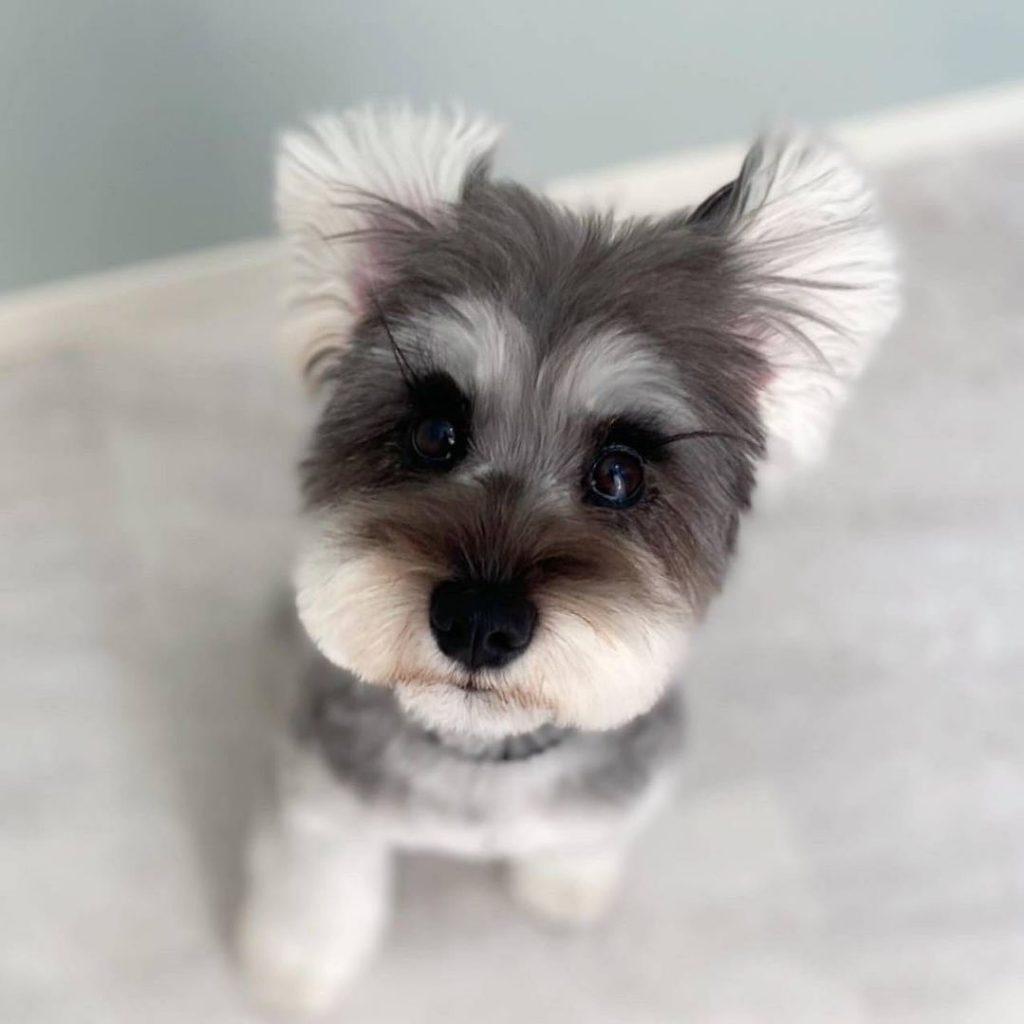
Schnauzers, with their distinct appearance and vibrant personalities, have captured the hearts of dog lovers worldwide. This breed is renowned for its wiry coat, bushy eyebrows, and the signature “beard” that gives it a somewhat human-like expression of curiosity and intelligence. Originating from Germany, the Schnauzer is not just one breed but encompasses three different sizes – the Miniature, Standard, and Giant, each fitting into various lifestyles and family sizes.
The Rich History of the Schnauzer Breed
The Schnauzer breed boasts a rich history that dates back to the 15th century in Germany, where they were primarily used as farm dogs due to their versatile skills. Their name, “Schnauzer,” originates from the German word for “snout,” which aptly describes their distinctive bearded snout. Initially bred for hunting vermin and guarding livestock, Schnauzers were valued for their intelligence, endurance, and protective nature.
As the breed evolved, so did their roles in society. The Standard Schnauzer, the original size, was joined by the Miniature and Giant varieties, each developed for specific purposes. Miniature Schnauzers became popular companions for families, while Giant Schnauzers took on more formidable tasks such as police and military work.
Understanding Schnauzers
Gaining a deep understanding of Schnauzers is essential for anyone considering bringing this dynamic breed into their life. Recognizing their characteristics and traits, as well as the breed standard for appearance and temperament, can provide valuable insights into how to train a Schnauzer and uncover some Schnauzer training secrets.
Breed Characteristics and Traits
Schnauzers are known for their distinctive characteristics and traits, which include:
- Intelligence: They are quick learners, making schnauzer training a rewarding experience.
- Loyalty: Their devotion to their families is unmatched.
- Alertness: They are always aware of their surroundings, making them excellent watchdogs.
- Energy: They possess a high level of energy, requiring regular exercise.
- Versatility: Schnauzers adapt well to various environments and lifestyles.
The Breed Standard: Appearance and Temperament
The breed standard for Schnauzers emphasizes a sturdy, robust build and a spirited, yet obedient, temperament. Appearance-wise, they are noted for their wiry coat, distinctive facial features, and elegant posture. Their temperament is a blend of alertness, intelligence, and affection, making them excellent companions. Understanding these standards is crucial for effective Schnauzer training, as it aligns with their natural tendencies and characteristics.
Schnauzer Dog Varieties and Their Unique Traits

Schnauzers come in three distinct sizes, each with its own set of unique traits that cater to different lifestyles and preferences. From the compact Miniature Schnauzer, perfect for apartment living, to the robust Standard and the formidable Giant Schnauzer, each variety brings its own charm and challenges, including how to train a Miniature Schnauzer and effective strategies for training a Schnauzer of any size.
Colors and Markings
The Schnauzer breed is known for its striking appearance, which varies not only in size but also in a range of colors and markings. These include:
- Black: A solid, deep black coat, often seen in all three varieties.
- Salt and Pepper: The most recognizable and common coloring, featuring a mix of black and white hairs that give a greyish appearance.
- Black and Silver: Similar to the salt and pepper, but with distinct black and silver markings, especially around the eyebrows, chest, and legs.
- White: Less common and usually seen in Miniature Schnauzers, featuring a pure white coat.
Understanding the unique traits and appearances of each Schnauzer variety can enhance the training process, as it allows for a tailored approach that considers the specific needs and characteristics of each size. Whether it’s mastering how to train a Schnauzer with its boundless energy or the calm assertiveness required for training a Schnauzer of a larger variety, recognizing these differences is key to a harmonious relationship.
Caring for Your Miniature Schnauzer
Caring for a Schnauzer involves more than just love and companionship. It requires understanding their specific needs in terms of health, grooming, nutrition, and exercise. By addressing these aspects, you can ensure your Schnauzer leads a happy, healthy life, while also managing any potential schnauzer behavior problems and weighing the standard schnauzer pros and cons.
Essential Health Information
Maintaining your Schnauzer’s health starts with regular veterinary check-ups and staying informed about conditions that may affect them. Being proactive about health care can prevent minor issues from becoming serious problems.
Common Health Conditions in Schnauzers
Schnauzers are generally healthy, but like all breeds, they can be prone to certain health conditions:
- Pancreatitis: Inflammation of the pancreas, often diet-related.
- Hip Dysplasia: A malformation of the hip joint that can lead to arthritis.
- Schnauzer Comedone Syndrome: A skin condition specific to Schnauzers, causing blackheads along the spine.
- Cataracts: Clouding of the eye lens, leading to impaired vision.
- Urinary Stones: Schnauzers are more prone to developing bladder stones than other breeds.
Grooming Your Schnauzer
Grooming is not just about keeping your Schnauzer looking good; it’s also crucial for their health. Regular brushing, nail trimming, and dental care are essential. Their distinctive coat requires professional grooming every 5-8 weeks to maintain its characteristic look and prevent matting.
Nutrition Needs and Recommendations
A balanced diet tailored to their specific life stage, size, and activity level is essential for a Schnauzer’s overall health. Avoid foods high in fat to prevent pancreatitis and consider incorporating fresh, whole foods for variety and added nutrients.
Exercise and Training Essentials
Schnauzers are energetic and intelligent, requiring regular physical and mental stimulation. Daily walks, playtime, and training sessions are vital. When it comes to training, positive reinforcement methods work best. Addressing schnauzer behavior problems early with consistent training is crucial. Understanding the standard schnauzer pros and cons can help tailor the training to your specific variety, whether it’s a Miniature, Standard, or Giant.
Exercise also plays a role in socialization, particularly in answering the question, “Are schnauzers good with other dogs?” With proper introduction and regular interaction, Schnauzers can get along well with other pets, though their strong personalities might require careful management to ensure harmony in multi-pet households.
Living With a Schnauzer

Living with a Schnauzer is an adventure filled with affection, energy, and the occasional challenge. Understanding the Schnauzer personality and their compatibility with families, kids, and other pets is crucial for a harmonious household. This understanding forms the foundation of any comprehensive schnauzers breed review and helps potential owners gauge if a Schnauzer, with its specific traits and miniature schnauzer size, fits into their lifestyle.
The Schnauzer Personality: What to Expect
Schnauzers are known for their spirited and vivacious personality. They’re intelligent, which makes them highly trainable, but also means they can be stubborn at times. This breed thrives on interaction and is known for its boundless energy and playfulness. Schnauzers are also fiercely loyal to their families, often forming a strong bond with one particular family member. Their alert nature makes them excellent watchdogs, as they are always keen on protecting their home and loved ones.
Compatibility With Families, Kids, and Other Pets
When it comes to family life, Schnauzers generally do well, especially when they’ve been properly socialized from a young age. Their playful nature makes them great companions for children, provided the kids are taught how to interact with dogs respectfully and safely. The miniature schnauzer size makes this variety particularly suited for families with limited living space.
Schnauzers can also live harmoniously with other pets, including cats, if introduced properly and early. However, their strong prey drive, a vestige of their vermin-hunting past, means they might chase smaller animals if not trained otherwise. Overall, Schnauzers make excellent family pets, but like with any breed, understanding and meeting their specific needs is key to a happy coexistence.
Preparing to Welcome a Schnauzer

Welcoming a Schnauzer into your home is a commitment that spans many years and requires thoughtful consideration. Before deciding to buy or rehome a Schnauzer, it’s important to assess your lifestyle, living environment, and ability to meet the breed’s needs.
Considerations Before Buying or Rehoming a Schnauzer
Schnauzers are a high-energy breed that thrives on interaction and mental stimulation. They require regular exercise and engagement to stay healthy and happy. Prospective owners should consider their daily routine and whether they can provide enough activity and companionship for their new furry friend. Additionally, Schnauzers have a strong personality and can be quite vocal, which might be a factor to consider, especially for those living in close proximity to neighbors.
Another important aspect is grooming. The Schnauzer’s distinctive coat requires regular maintenance, including professional grooming every few months. This not only keeps them looking their best but also helps prevent skin issues and ensures their comfort. Potential owners need to be prepared for the time and financial commitment grooming entails. Considering these factors carefully can ensure that you and your Schnauzer enjoy a long, happy, and healthy life together.
Frequently Asked Questions
Do Schnauzers Shed?
Schnauzers are often celebrated for their minimal shedding, making them a suitable choice for individuals with allergies or those who prefer a cleaner home environment. Their wiry coat does lose some hair, but significantly less than many other dog breeds. Regular grooming helps to keep any shedding under control and maintains the health and appearance of their distinctive coat.
Are Schnauzers Known for Being Affectionate?
Absolutely, Schnauzers are known for their affectionate nature, especially towards their family members. They form strong bonds with their owners and often seek out companionship and attention. Their loyalty and protective instincts make them not just pets, but devoted members of the family, always ready to offer love and comfort.
Can Schnauzers Coexist With Cats?
Yes, Schnauzers can coexist peacefully with cats, especially if they are raised together from a young age or properly introduced in a controlled manner. Early socialization and positive reinforcement can encourage harmonious relationships between Schnauzers and feline companions, overcoming the breed’s natural prey drive.
How Do Schnauzers Handle Being Alone?
Schnauzers are social creatures that thrive on interaction and may struggle with being left alone for extended periods. They can develop separation anxiety, leading to destructive behavior or excessive barking. Providing mental stimulation, such as toys or puzzles, and gradually acclimating them to short periods alone can help manage this issue.
Tips for Training Your Schnauzer
Training a Schnauzer requires patience, consistency, and positive reinforcement. Here are a few tips:
- Start training early to establish good habits and socialization.
- Use rewards and praise to encourage desired behaviors.
- Keep training sessions short and engaging to maintain their interest.
- Address any schnauzer behavior problems immediately to prevent them from becoming ingrained.
- Be patient and consistent, as Schnauzers can be stubborn but respond well to clear and positive training methods.
Where to Find a Schnauzer

If you’re looking to welcome a Schnauzer into your home, there are several avenues to consider. Reputable breeders are a great starting point; they prioritize the health and temperament of their dogs and can provide valuable insight into the breed. Adoption from rescue organizations or shelters is another commendable option, offering the chance to provide a loving home to a Schnauzer in need. Regardless of the source, it’s crucial to conduct thorough research and ensure the Schnauzer’s health and well-being are the top priorities.
Final Thoughts on Schnauzer Ownership
Owning a Schnauzer is a rewarding experience filled with love, energy, and companionship. These intelligent, affectionate dogs make wonderful family members, adapting well to various lifestyles. However, they do require commitment in terms of training, exercise, and grooming. Before deciding on a Schnauzer, consider their unique needs and whether you can provide a nurturing environment. With the right care and attention, a Schnauzer can become an irreplaceable part of your life, offering years of joy and loyalty.
Is a Schnauzer the Right Dog for You?
Deciding if a Schnauzer is the right dog for you requires careful consideration of your lifestyle, time, and resources. These spirited dogs thrive on companionship, mental stimulation, and physical activity. They’re suited to active individuals or families who can engage in their care and training. Remember, Schnauzers need regular grooming and can be vocal. If you’re prepared for these commitments and looking for a loyal, intelligent, and affectionate companion, a Schnauzer could be the perfect addition to your home, bringing endless joy and a unique personality into your life.
